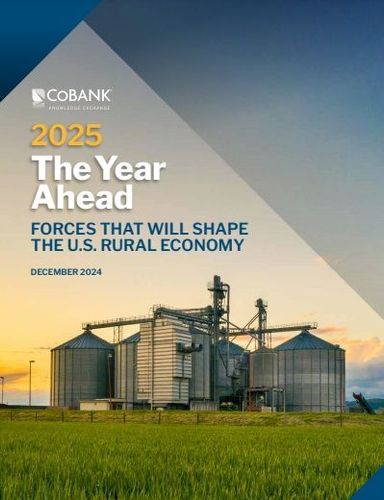CoBank predicts modest growth in renewable diesel, SAF capacity next year

SOURCE: CoBank
December 18, 2024
BY Erin Voegele
CoBank predicts that U.S. production of renewable diesel and associated fuels will experience a modest boost in 2025 but cautions that policy uncertainty looms over administration of the Renewable Fuel Standard program, small refinery exemptions (SREs), and the impact of potential tariffs.
CoBank discussed the outlook for the U.S. biofuel industry in a report released Dec. 12, titled “The Year Ahead: Forces That Will Shape the U.S. Rural Economy in 2025.”
The report notes that the biofuel sector is facing several headwinds in 2025 stemming from both political and regulatory uncertainty. Some of that impact, however, could be offset by continued tailwinds from strong exports and higher biofuel mandates from countries around the world.
Advertisement
Advertisement
CoBank cites U.S. Energy Information Administration data that predicts biodiesel supplies will drop nominally in 2025, while renewable diesel production will increase from 210,000 barrels per day in 2024 to approximately 230,000 barrels per day in 2025. The production of other associated biofuels, including renewable naphtha, renewable propane and sustainable aviation fuel (SAF) are also expected to increase.
Renewable diesel capacity is expected to increase 100 MMgy in 2025, to 5.2 billion gallons per year. That level of capacity is expected to remain unchanged in 2026. SAF production could expand to nearly 50,000 barrels per day in 2025 if all announced capacity additions come online, according to CoBank.
The U.S. EPA’s RFS renewable volume obligations (RVOs) for 2023-2025 hindered expansion of biobased diesel production capacity, as those RVOs were set far below potential production volumes. The biobased diesel sector will likely continue to be impacted by policy concerns.
According to CoBank, the incoming Trump administration is unlikely to quickly propose new RFS renewable volume obligations (RVOs) for 2026-2029. Rather, the administration is expected to wait for actions on pending SREs. CoBank notes that during the previous Trump term, the U.S. EPA granted 34 SREs filed seeking exemptions for the 2017 RFS compliance year. The Biden administration has not approved any SREs and has to date denied 79 SRE petitions.
Advertisement
Advertisement
Federal and state tax incentives and low carbon fuel policies are expected to be the primary drivers for additional SAF production. CoBank cautions that the potential benefits of federal tax policies are being limited by a short tax credit runway for the 45Z clean fuel production credit, delayed regulatory guidance and uncertain political actions. The California Air Resources Board’s decision to limit the use of soybean oil, canola oil and sunflower oil under its Low Carbon Fuel Standard is also putting downward pressure on the use of those feedstocks for renewable diesel production.
According to the report, tariffs or other regulatory actions could impact the feedstock mix for biobased diesel fuels by limiting imports of used cooking oil (UCO) and tallow. U.S. imports of those feedstocks could also be impacted by the domestic build-out of renewable fuels in China and Brazil where production of those imported oils originates.
A full copy of the report is available on CoBank’s website.
Related Stories
The USDA significantly increased its estimate for 2025-’26 soybean oil use in biofuel production in its latest World Agricultural Supply and Demand Estimates report, released July 11. The outlook for soybean production was revised down.
U.S. fuel ethanol capacity fell slightly in April, while biodiesel and renewable diesel capacity held steady, according to data released by the U.S. EIA on June 30. Feedstock consumption was down when compared to the previous month.
The U.S. EPA on July 8 hosted virtual public hearing to gather input on the agency’s recently released proposed rule to set 2026 and 2027 RFS RVOs. Members of the biofuel industry were among those to offer testimony during the event.
The U.S. exported 31,160.5 metric tons of biodiesel and biodiesel blends of B30 and greater in May, according to data released by the USDA Foreign Agricultural Service on July 3. Biodiesel imports were 2,226.2 metric tons for the month.
The USDA’s Risk Management Agency is implementing multiple changes to the Camelina pilot insurance program for the 2026 and succeeding crop years. The changes will expand coverage options and provide greater flexibility for producers.
Upcoming Events










